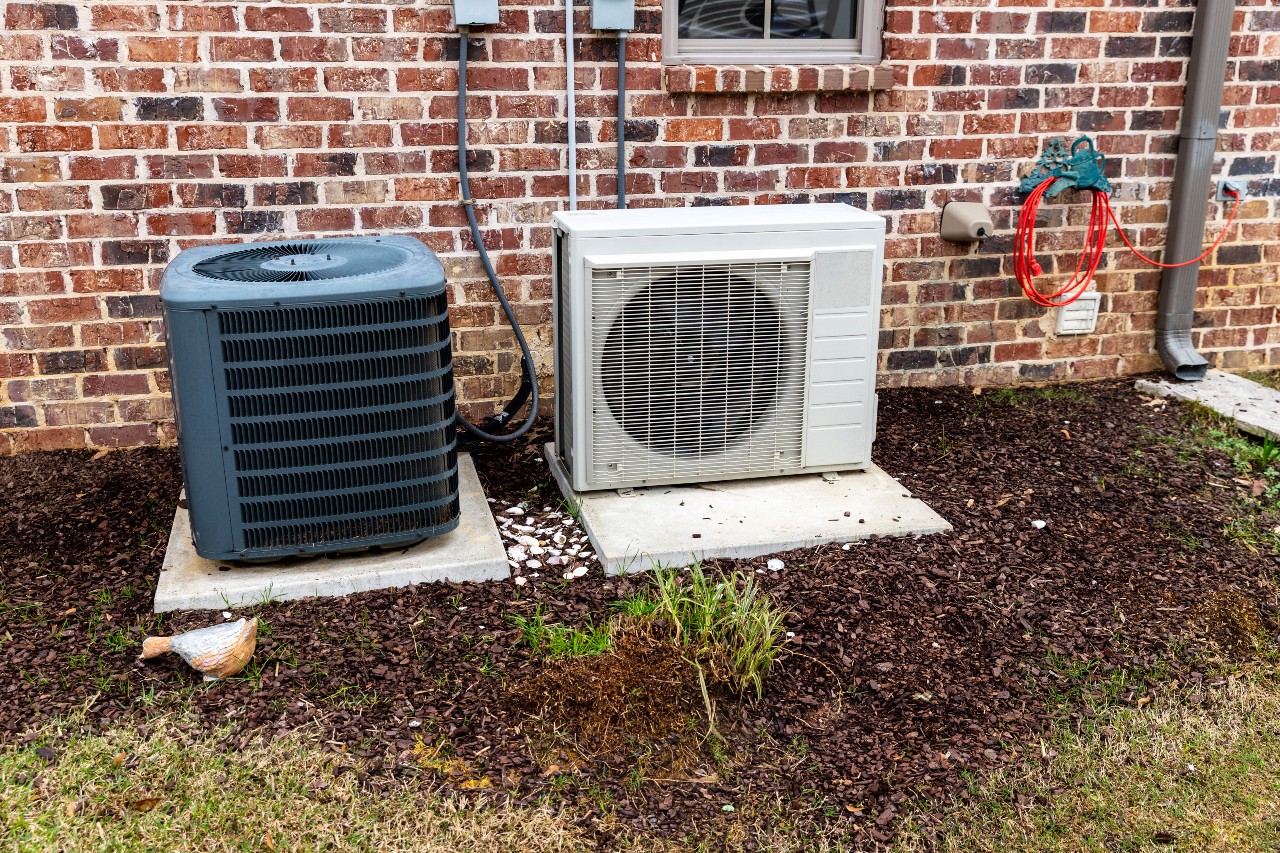Pros and Cons: Ductless Mini Split Systems vs Centralized Air Conditioning System
Are you planning soon to buy an HVAC system? Do you know the different types of energy systems that are available and how they may suit your needs?
If you are like many others, you probably need some guidance and insights to understand what the various types of equipment on these HVAC units do and how that will impact your home’s ambient air and your pocketbook.
Have you heard of ductless mini-splits? Do you know how they are different from a traditional centralized air conditioning system?
In this blog space, we will look at the pros and cons of these two types of A/C units. We hope you will then feel confident to purchase the appropriate air conditioning system that will work well for your particular home and fit within your budget needs.
The Pros of Ductless Mini-Split HVAC Systems

Built-In Zoning
You will most commonly see mini-splits in individual living spaces such as patios, sunrooms, finished basements, and garages.
A major benefit of ductless mini-split A/C systems is that larger mini-split systems have multiple indoor units. If you have multiple mini-split units – also known as heads – in your home, one can be operating while the other is off. In fact, one can be heating while another is cooling.
This enables you to have exact control over the comfort levels in various living spaces in your home. Ductless mini-splits are the perfect solution if you have rooms in your residence that never seem to be at the right temperature, and if you want more temperature control in frequently occupied rooms.
Flexibility
You benefit by enjoying ultimate flexibility with ductless systems that let you set a heating or cooling solution to your specific needs in different rooms in your home. It is worth noting that mini-splits are also usually used in conjunction with central air systems. Rooms in your home, such as a finished basement or an attic guest room, typically do not have ductwork for a central air system to connect to.
The ideal solution to make these rooms more usable is to pair your traditional system with an individual mini-split for that particular living space.
Efficiency
One of the most significant benefits of this type of air conditioner is energy efficiency. Mini-split systems contain the most sophisticated technology in the HVAC industry. In fact, these units use inverter technology to convert high-voltage electricity into DC voltage. This allows them to operate with minimal energy.
This boosts the SEER ratings to reach over 30 on the cooling side, with the same energy efficiency for heating, as well.
Mini-splits also utilize variable-speed compressors. This allows them to operate as much or as little as required. Conversely, the majority of central air units have just one or two speed, and they have to switch on and off more frequently.
Less Maintenance
It is true that while ductwork can work well for an A/C system, it can also be expensive in the form of high maintenance costs. A ducted system needs modifications for new equipment, cleaning, maintenance, which take time and money.
The lower maintenance requirements make a ductless system a viable alternative.
The Cons of Ductless Mini-Split
Line Aesthetics
Ductless systems are composed of a line that runs from the indoor to the outdoor unit, and, due to the fact that mini-splits are located in obscure places, the line must run down the side of your home or around corners of it. This line includes electrical connectors and condensate drainage.
This is likely to be an eyesore for any house.
Drainage
Mini-split systems regulate humidity by collecting moisture into the condensate line. Typically, this line is able to use gravity to run the condensate outside to a drain.
Nonetheless, depending on its location, this might not always be the case. When this does occur, a condensate pump is required to transport the moisture outside. Condensate pumps could add to noise, cost and maintenance.
Initial Price
Although ductless systems can be much more efficient, resulting in considerably lower energy costs when compared to central air, the drawback is that the initial cost is greater. This might be challenging to understand, as mini-splits are thought of as the smaller option. However, in a direct comparison with an area that they cool or heat, the initial expense is more for a mini-split system.
Filtration
While ductless systems have air filters, they are not as powerful as ducted filtration systems – which will do a better job at eliminating allergens, odors, and dust from your home.
There are carbon inserts that are able to be added to mini-split units, which will address some of these issues. However, they need to be occasionally replaced. Based on the usage of your system, this can be quite a daunting task.
Finally, air purifiers can be fitted into certain mini-split systems, however, this will be restricted by the zoning that is inherent to the system.
Maintenance
As you probably already know, all HVAC equipment needs maintenance on a regular basis. If that does not happen, your HVAC system will not operate efficiently and it will experience mechanical problems and lead to higher utility bills.
However, with ductless systems, their filters require frequent cleaning. Because most ductless systems are used year-round, cleaning filters every few weeks is recommended.
Too many homeowners don’t follow through with cleaning the filters that often, and that could lead to reduced efficiency and more malfunctions.
The Pros of Central Air Conditioning

Size & Range
The good news for those of you who reside in larger homes, is that central air systems are equipped to more effectively heat and cool houses your size. Conversely, ductless systems could have as many as five heads in a home, so they can treat air in more than one or two rooms.
If you want to make sure you have adequate heating and cooling consistently throughout your home, the choice is easy: a ducted system.
Less of an Initial Cost
As mentioned above, ductless systems come with a big upfront cost, which is why central air is considerably more affordable. This is even more the case if you have a home that has existing ductwork that does not require modifications.
What’s more, the higher-efficiency A/C systems, heat pumps, and furnaces will get approximately a 20 SEER rating, which means the gap is not necessarily considerable in efficiency based on the equipment you select.
Integration with Air Quality Products
The filtration options for ducted, central air systems are substantially more effective than they are for mini-split systems.
Also, many air quality products easily integrate with whole-home, ducted systems. They include humidifiers, dehumidifiers, and air purifiers.
All of this means you experience much better air quality with a ducted, central air system in your home. An example of the greater efficiency is found in add-ons like a dehumidifier that can work with your ductwork to decrease the workload on air conditioning.
More Options
When you have a ducted, central air system in your home, you enjoy the benefit of a greater number of options than you have for mini-splits.
The Cons of Central Air Conditioning
Duct Maintenance
It is important to modify and repair ductwork, and that can be costly over time. That is why it makes sense to have ductwork cleaned and maintained properly and periodically.
Although maintenance plans normally cover a lot of features that relate to the operability of your entire energy system, modifications to your existing ductwork are typically not covered. It is recommended that you inquire with your HVAC contractor to find out how you should address the upkeep of your ductwork.
Utility Bills
If the zone control of a ductless system reduces your energy bills, treating the air throughout your whole home when you’re occupying only some rooms will lead to higher utility bills.
While a new, efficient central air system will significantly cut down on your bills, when compared to mini-split systems, it falls short.
Temperature & Zone Control
The majority of air conditioning systems have two settings: on and off. Then there are two-speed systems that increase this slightly. The high-end variable-speed systems will operate along the lines of mini-split systems.
In most circumstances, you will do your pocketbook a favor when you opt for a one-or two-speed system.
Even though newer systems operate more efficiently than older systems, the fact is ducted, central air systems lack the versatility and exact control of air temperatures that a mini-split system offers.
Look to Apollo Heating and Air Conditioning for Expert Maintenance of Your HVAC
Look to the HVAC experts at Apollo to ensure your energy system is in excellent condition and operating at optimal efficiency so you can stay cool and comfortable this summer. Our experienced team of highly trained HVAC technicians will work with you and exceed your expectations during HVAC repairs and A/C unit replacements.
Apollo field technicians will work closely with you in deciding what HVAC system is the best, and tailor it to fit your unique needs and preferences! We are committed to delivering premium quality HVAC service, maintenance, products, and documentation in Kennewick, Pasco, Richland, and beyond!
Learn more by contacting Apollo Heating and Air Conditioning! Call us at (509) 396-COLD (2653).



